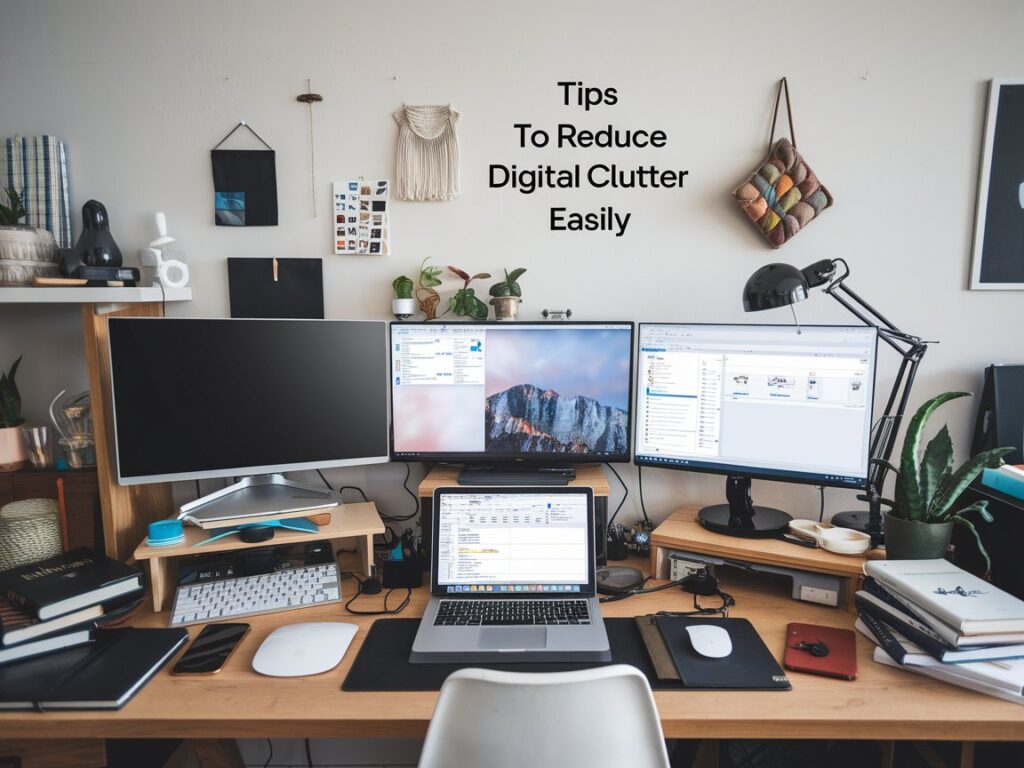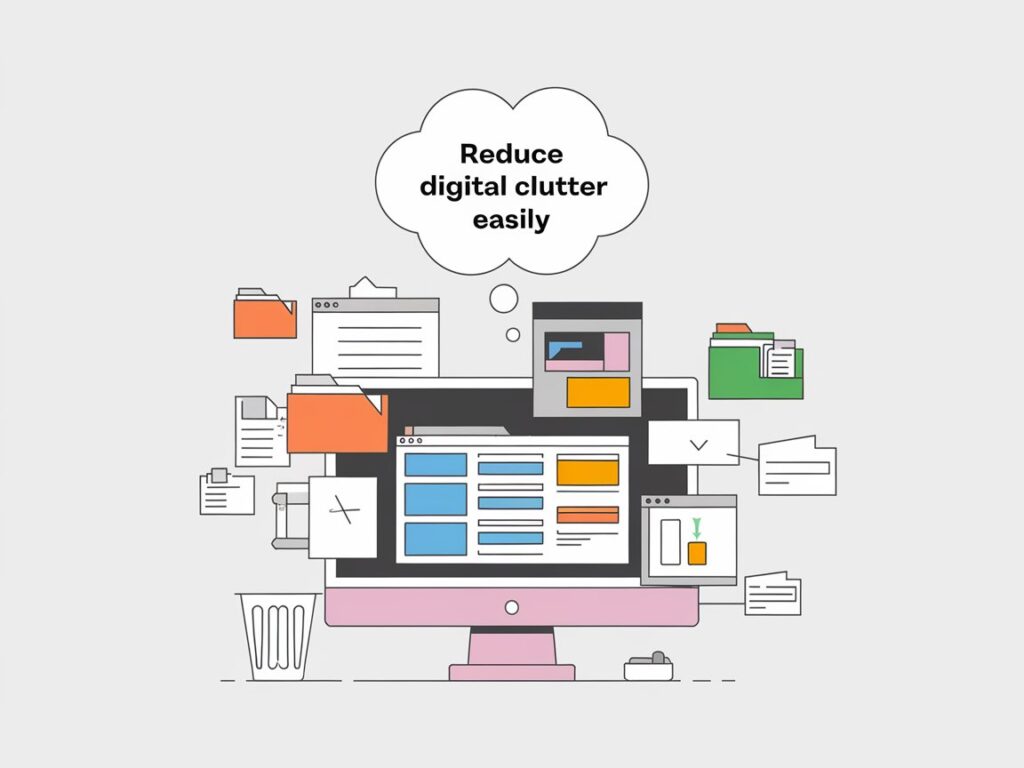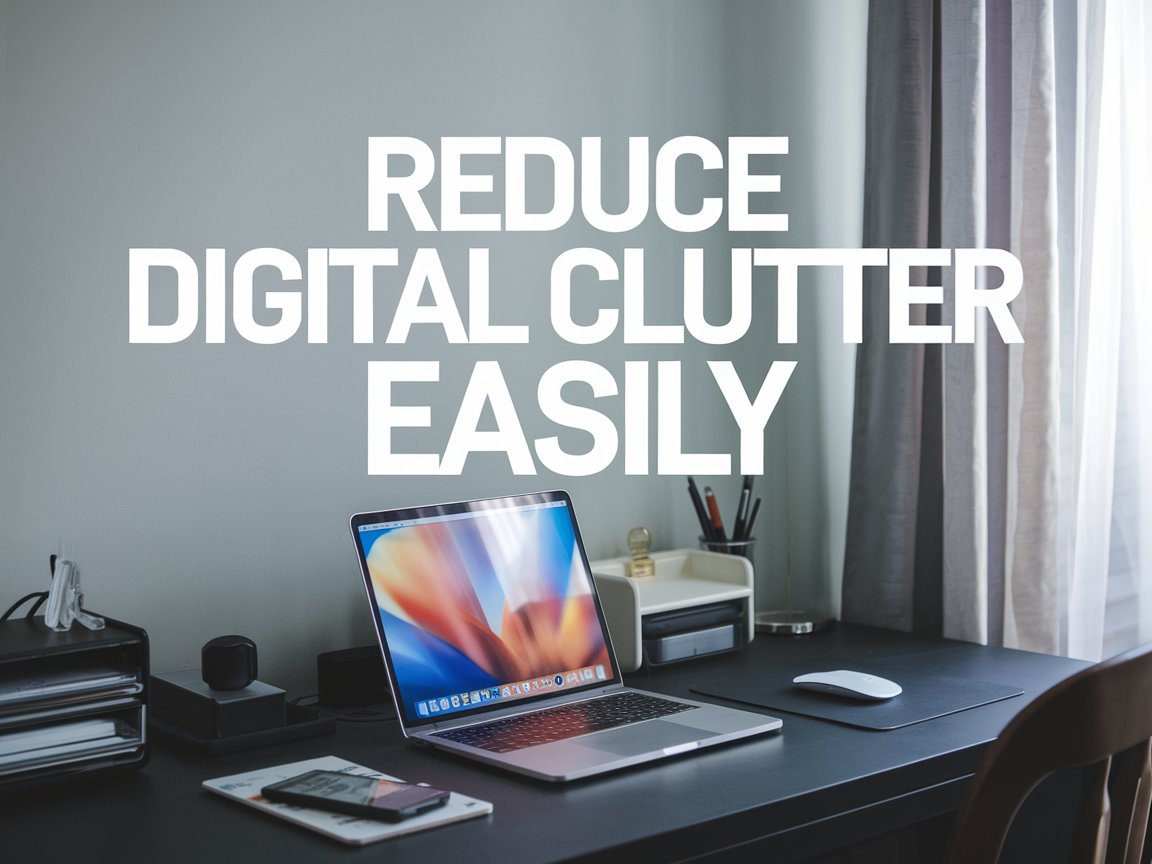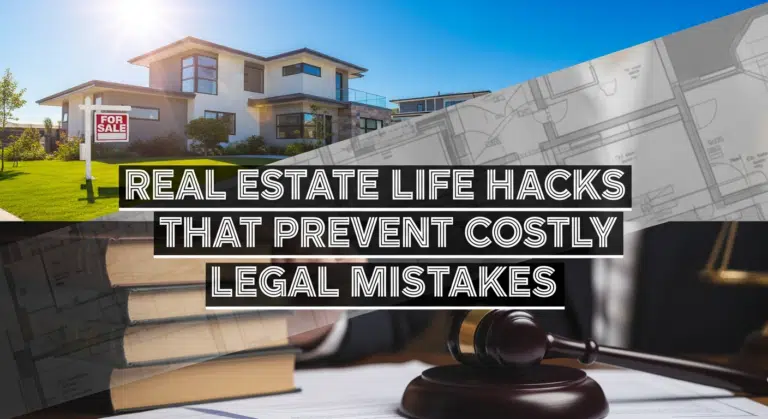Digital clutter builds up over time. From files to apps, emails to notifications, we gather digital items that clutter our devices and minds.
This clutter slows us down and makes it hard to focus. Keeping your digital space clean is important. It saves time, boosts productivity, and gives peace of mind.
In this guide, we’ll talk about easy ways to reduce digital clutter. You’ll learn how to keep files neat, manage emails, and clear up social media.
We’ll also explore tips for desktop cleanup and using digital tools to stay organized. Following these steps will help you feel more in control of your digital life.
What is Digital Clutter?
Digital clutter is any unnecessary digital data or files that take up space. This could be old emails, unused apps, or outdated files. Unlike physical clutter, digital clutter is often hidden. Many people don’t notice it until their devices slow down or they can’t find important files.
Digital clutter impacts mental focus. When files are scattered, it’s harder to stay productive. Research shows that disorganization causes stress and wastes time. For example, a messy inbox can overwhelm us and lead to missed deadlines. Reducing digital clutter clears up mental space, allowing you to focus better on your tasks.
Decluttering isn’t just about deleting files. It’s also about organizing your digital world. Sorting files, managing apps, and clearing unnecessary data is key to staying productive. Cleaning up your digital life helps you stay in control and worry less.

24 Tips to Reduce Digital Clutter Easily
Regular maintenance and backups keep your digital space efficient and stress-free. Read on for 24 easy tips to reduce digital clutter
1. Organize Your Files and Folders
One of the best ways to manage digital clutter is to organize your files and folders. Start by creating a system for storing files. For example, you could categorize your documents by topic or date. This will make it easier to find important files when you need them.
Take some time to clean up your existing files. Go through each folder and delete anything you no longer need. Move old or rarely-used files to an archive folder.
This keeps your main folders clean. You can also store important files in the cloud using tools like Google Drive or Dropbox. This not only frees up space but also keeps your data safe.
Keeping your files and folders neat should be a regular task. Take some time each week to organize your digital storage space. You’ll find that it becomes easier over time, and you won’t have to deal with the stress of a messy digital life.
2. Review and Delete Unused Apps
Unused apps take up valuable space on your devices. These apps can slow down your phone or computer, even if you’re not using them. Review your apps and delete any you don’t need. This simple step will free up storage space and make your device run faster.
You can set a reminder to review your apps every few months. This way, you’ll stay on top of things and avoid clutter building up again. Also, some apps may run in the background, draining your battery. Deleting these apps can improve your device’s performance.
Make sure to focus on apps that you no longer use. You’ll be amazed at how much space you can reclaim. By doing this regularly, you can keep your device functioning smoothly and prevent future clutter.
3. Unsubscribe from Unnecessary Emails
Your inbox can easily become cluttered with emails. Newsletters, promotions, and other unwanted messages pile up quickly. Unsubscribing from these emails will help clean up your inbox. Many tools, like Unroll. Me or Clean Email, can help you unsubscribe from multiple emails at once.
A clean inbox improves your focus and productivity. You’ll spend less time sorting through unwanted emails and more time on important tasks. Set aside time to review your inbox weekly. You can also create folders to store emails you need for later.
Unsubscribing is a quick and effective way to manage digital clutter. With fewer emails to worry about, you’ll feel more in control of your inbox and avoid unnecessary distractions.
4. Clear Your Desktop and Downloads Folder
A cluttered desktop can cause stress. If you have too many icons on your desktop, it can be hard to find what you need. Start by deleting unnecessary shortcuts and files. Move important files to appropriate folders. This will make your desktop clean and organized.
Your downloads folder also fills up quickly. Most people forget to clean it regularly. Go through the folder and delete items you don’t need. You can also set up an automatic system where files in your downloads folder are sorted or deleted after a set period.
Keeping both your desktop and downloads folder clean will save time. You won’t need to search through clutter to find important items. Your device will also perform better with fewer files taking up space.
5. Archive Old Data
Old files, photos, and documents can take up a lot of space. Archiving these items keeps them safe without cluttering your active folders. Use cloud storage solutions like Google Drive or OneDrive to store old data. This helps free up space on your device while keeping your files accessible.
You should archive data regularly. Set a schedule to review and move old files to your archive. This keeps your active folders clean and organized.
Archiving is also helpful for keeping important data safe. Cloud storage solutions allow you to access your files from anywhere, ensuring you don’t lose anything valuable.
Keeping your digital space organized requires some effort. But by archiving old data, you’ll have more room for new projects and less stress about losing important files.
6. Clean Up Your Social Media
Social media can quickly become cluttered with unnecessary posts and connections. Cleaning up your social media accounts helps you stay focused and reduces distractions. Start by unfollowing accounts that no longer add value to your feed. You can also delete old posts that are no longer relevant.
Review your privacy settings as well. Keeping a clean and secure social media presence is important for your digital well-being. Tools like Social Book Post Manager can help you clean up posts in bulk. You can also organize your accounts by creating lists or saving important posts in folders.
Regular social media cleanups keep your feed relevant and make your online presence more manageable. With fewer distractions, you’ll spend less time scrolling and more time on important tasks.
7. Desktop Cleanup
A clutter-free desktop improves focus. The fewer icons and files you have on your desktop, the easier it is to navigate your device. Keep only essential items on your desktop. Move other files into appropriate folders or store them in the cloud.
Clearing your desktop should be a regular habit. Set a reminder to clean up your desktop once a week. This keeps it tidy and helps you stay organized. You’ll find that your device runs more smoothly with fewer files cluttering up your space.
Desktop cleanup is a simple but effective way to reduce digital clutter. By maintaining a clean workspace, you can improve your focus and get more done throughout the day.
8. File or Delete Photos
Photos can take up a lot of space on your device. Over time, it’s easy to accumulate thousands of photos. To reduce digital clutter, go through your photo library regularly. Delete duplicates and photos that no longer serve a purpose. You can also move important photos to cloud storage to free up space.
Organizing your photos into folders makes it easier to find specific ones when you need them. You can categorize your photos by date, event, or location. This keeps your photo library neat and manageable.
Managing your photos is an ongoing process. Make it a habit to review your photo library every month. By doing so, you’ll keep your devices clutter-free and improve their performance.
9. Practice Regular Maintenance
Regular maintenance is key to keeping digital clutter in check. Set aside time each week or month to review your devices. Go through your files, emails, and apps, and delete or organize what you no longer need. How to prevent clutter from building up over time.
There are many tools available that can automate this process. For example, apps like CCleaner can scan your device for unnecessary files and delete them. Automating maintenance makes it easier to keep your digital space clean without much effort.
Digital maintenance is a habit worth developing. By practicing regular maintenance, you’ll avoid the stress of a cluttered device and enjoy a smoother digital experience.
10. Create Digital Detox Days
Sometimes the best way to manage digital clutter is to take a break. Digital detox days are days when you stay offline and away from your devices. This gives your mind a break and helps you reconnect with the real world.
You can schedule regular detox days or take a break whenever you feel overwhelmed. Studies show that taking time away from screens improves mental health and focus. During a digital detox, you can also review your digital habits and make changes to reduce clutter.
Digital detox days are a powerful tool for improving your overall well-being. They give you time to reset and reflect on how you use your digital space.
11. Define Your Digital Priorities
Before you can effectively reduce digital clutter, you need to know what’s important. Take some time to define your digital priorities. Ask yourself which apps, files, and tools are essential to your daily life. This will help you focus on what matters and get rid of the rest.
Once you know your priorities, you can start organizing your digital space around them. Keep the most important items within easy reach, and move less important ones out of the way. This makes it easier to stay focused and avoid unnecessary distractions.
Defining your digital priorities helps you take control of your digital life. You’ll feel more organized and less overwhelmed by the endless stream of information.
12. Evaluate Your Digital Habits
Your digital habits play a big role in how cluttered your devices become. Take some time to evaluate your habits. Do you check your phone too often? Do you subscribe to too many
newsletters? Understanding your habits helps you make better decisions about how to manage digital clutter.
You can use tools like Screen Time or Digital Wellbeing to track your usage. These tools give you a clear picture of how much time you spend on different apps and activities. From there, you can decide which habits to change or eliminate.
Evaluating your digital habits is a crucial step in staying clutter-free. It helps you become more mindful of how you use your devices and prevents unnecessary clutter from building up.
13. Remove Notifications
Notifications can be a major source of digital clutter. Constant alerts from apps, emails, and social media make it hard to focus. Removing or limiting notifications helps you stay focused on what’s important.
You don’t have to remove all notifications. Instead, focus on reducing unnecessary ones. For example, you can turn off social media alerts but keep work-related notifications on. This way, you’ll get fewer distractions without missing important information.
By managing your notifications, you can reduce digital noise and create a more peaceful digital environment.
14. Streamline Notifications
Streamlining your notifications is a smart way to manage digital clutter. Instead of receiving alerts from every app, focus on the ones that matter most. You can do this by adjusting your notification settings in each app. Prioritize notifications from work apps or family-related updates while muting others.
This practice helps you stay focused and reduces distractions. You can also set specific times to check notifications instead of reacting to them throughout the day. Streamlining your notifications creates a more peaceful and organized digital space.
15. Back Up Your Files
Backing up your files is a must for anyone looking to stay organized. A backup ensures that you won’t lose important data if your device crashes or gets damaged. You can back up your files to an external hard drive or use a cloud service like Google Drive or iCloud.
Set up automatic backups to make sure your files are regularly saved. This way, you won’t have to worry about losing anything important. We also recommend keeping backups in a safe place.
Backing up your files gives you peace of mind. You’ll always have access to your important data, even if something goes wrong.
16. Clean Up Your Email Inbox
A cluttered inbox makes it hard to stay organized. Start by categorizing your emails into folders. For example, create folders for work, personal messages, and promotions. This helps you quickly find important emails when needed.
Delete or archive emails you no longer need. Regularly cleaning your inbox keeps it manageable. You can also use email tools like Clean Email to automate the process of sorting and deleting old emails.
A clean inbox improves productivity and reduces stress. You’ll spend less time sorting through unnecessary messages and more time focusing on what matters.
17. Invest in Digital Tools
There are many digital tools that can help you manage clutter. For example, file organization apps, photo management tools, and email organizers can save time and keep your digital space neat. Trello and Evernote are great tools for managing tasks and organizing files.
When choosing a tool, focus on your specific needs. Whether you need help with managing files or streamlining notifications, there’s a tool out there to help. Some tools are even free, making it easy to stay organized without spending too much.
Investing in the right digital tools can make a big difference in how you manage clutter. With the right support, you’ll be able to stay organized and focused.
18. Review Your Subscriptions
Digital subscriptions can quickly pile up. From streaming services to newsletters, you may be paying for or receiving services you no longer need. Take time to review all your subscriptions. Delete anything that’s no longer useful.
You can set reminders for when subscriptions renew. This gives you time to review if they are still necessary. Services like Truebill can also help you track and manage your subscriptions.
By reviewing your subscriptions, you’ll save money and avoid digital clutter. You’ll also gain control over your inbox and app usage.
19. Secure Your Digital Identity
Your digital identity is important. Keeping it secure should be a priority. First, use strong passwords for all your accounts. You can use a password manager to create and store these passwords.
Enable two-factor authentication (2FA) for added security. This ensures that even if someone gets hold of your password, they’ll need a second piece of information to access your account. You should also update your passwords regularly.
Securing your digital identity helps protect you from fraud and keeps your accounts safe. It’s a small but crucial step in managing your digital life.
20. Start with a Digital Inventory
A digital inventory is a list of all your apps, files, and subscriptions. Start by writing down everything you use. Then, go through the list and decide what to keep, delete, or organize.
A digital inventory helps you see how much clutter you have. It also makes it easier to plan your decluttering process. By keeping an inventory, you’ll stay on top of your digital life and avoid unnecessary clutter.
21. Unfollow
Unfollowing accounts on social media can reduce distractions. Take a few minutes to go through your followers list. Unfollow accounts that no longer provide value. This helps keep your feed clear and relevant.
You can also mute or hide accounts that you don’t want to unfollow but don’t want to see often. This keeps your social media experience clutter-free.
By regularly unfollowing, you’ll reduce digital clutter on social media. It’s a quick and easy way to improve your online experience.
22. Unsubscribe
Unsubscribing from newsletters and promotional emails is a simple way to clear your inbox. You can use tools like Unroll. Me to easily unsubscribe from multiple emails at once. This keeps your inbox tidy and reduces distractions.
Make it a habit to unsubscribe from unnecessary emails every few months. By doing so, you’ll keep your inbox clutter-free and stay focused on important messages.
23. Uninstall Apps
Unused apps take up valuable space on your devices. Review your apps regularly and uninstall the ones you no longer need. This frees up storage space and improves your device’s performance.
Some apps may also run in the background, using battery and data. By uninstalling these apps, you’ll keep your device running smoothly.
Regularly uninstalling unused apps helps prevent digital clutter from building up. It’s a simple way to keep your devices organized.
24. Declutter the Desktop
A cluttered desktop can slow you down. Start by removing unnecessary shortcuts and icons. Keep only essential items on your desktop. This keeps it neat and easy to navigate.
You can also organize your files into folders or store them in the cloud. This reduces the number of items on your desktop and makes it easier to find what you need.
Decluttering your desktop is a small but effective step in managing digital clutter. It helps you stay focused and organized throughout the day.

FAQs About Reduce Digital Clutter Easily
Key Takeaways
- Digital clutter reduces productivity and focus.
- Regular cleanup improves device performance.
- A well-organized digital space saves time.
- Small steps can make a big difference in managing clutter.
Reducing digital clutter may seem like a big task. But with small steps, you can make a big difference. From organizing your files to cleaning up your inbox, each action helps create a more focused and stress-free digital life. The key is to make these practices a habit.
By regularly reviewing your devices, managing notifications, and staying on top of your digital priorities, you’ll enjoy a cleaner and more productive digital space.




